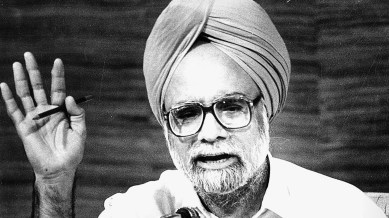As RBI Gov, Manmohan Singh brought comprehensive reforms related to banking sector
The groundwork for the expansion of financial markets was also done under his tenure.

Dr Manmohan Singh took the reins of the Reserve Bank of India (RBI) on September 16, 1982, and held office till January 14, 1985. He was appointed as the 15th RBI Governor under the then Finance Minister Pranab Mukherjee.
In his nearly two-and-a-half-year term as the RBI Governor, Singh carried out comprehensive legal reforms related to the banking sector. He introduced a new chapter in the Reserve Bank of India Act and helped set up the Urban Banks Department to supervise the affairs of Urban Cooperative Banks.
He laid down the foundations for modern day monetary policymaking which would be consistent with high growth.
It was during his term that the Banking Laws (Amendment) Act, 1983 widened the scope of activities that banks could undertake (such as leasing), provided nomination facilities to account holders, strengthened the powers of the Reserve Bank, streamlined returns and prohibited unincorporated bodies from accepting deposits from the public except to a specified extent amongst others.
He ensured that the loans extended by banks provided the required stimulus to vital sectors of the economy, without fuelling inflationary expectations and speculative inventory build-up. He also stressed on banks meeting their demand for credit from their own resources.
In order to boost rural development, Singh focused on ensuring availability of credit to underserved areas, paving the way for inclusive growth.
Singh insisted on the integration of monetary and fiscal policies during his tenure as the RBI Governor.
In one of his addresses at an event in Mumbai in 1982, Singh exhorted that if “monetary restraint was to achieve its objective without too much loss of potential output, excessive burden must not be placed on monetary policy, and the fiscal system must be so operated as to avoid excessive recourse to the Reserve Bank credit to finance public expenditure”. He had suggested deeper examination of fiscal imbalances in various states.
“If we take seriously the objective of accelerated growth in a regime of reasonable price stability and viable balance of payments we cannot assume that the resources which are not mobilised can somehow be made available through expansion of bank credit. Unless it is clearly understood, monetary policy cannot be expected to operate smoothly and effectively. Here lies both a challenge as well as an opportunity,” Singh had said at that event.
The groundwork for the expansion of financial markets was also done under his tenure.
After his tenure ended in January 1985, Singh moved to the Planning Commission as Deputy Chairman. He was later appointed as Finance Minister, wherein he was instrumental in bringing in economic reforms in the country.